Music, Wellbeing and Mental Health 2019
Hereford College of Arts, 11-12 May 2019
The Music, Wellbeing and Mental Health Study Day and Workshop Day took place at Hereford College of Arts on 11 and 12 May 2019; it was organised between the Royal Musical Association, Hereford College of Arts, the British Forum for Ethnomusicology, and the National Association for Music in Higher Education. The Saturday programme included a range of papers by students and early-career researchers, which displayed the latest research around the effects of music on wellbeing and mental health, as well as musicians’ health. On the Sunday, the delegates took part in different workshops that explored similar themes practically.
Following on from the success of the event at York St John last year, Hereford College of Arts and popular music lecturer Rosario Mawby welcomed the event to their institution with open arms. The technical set-up was carried out by undergraduate students who actively participated in the event; it was great to have them participate in important conversations around music and mental health!
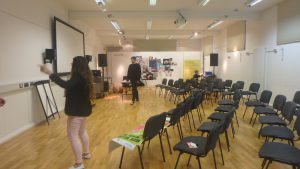
Study Day on Music and Health
The first session of the study day was centred around the theme of the wellbeing of musicians. Marriana Cortesi (University of York) discussed the effect of competitions on musicians’ mental health. Davinia Bailach Cabrerizo (University of Derby) presented her excellent undergraduate dissertation for which she examined the effect of wellbeing session for young musicians at a local conservatoire in Spain. Finally, Nellinne Rannaweera (Royal Northern College of Music) showed her study into musicians’ leisure activities. While the session flagged up the potential risks to wellbeing and mental health that high-performing music students incur, there is also a high rate of personal satisfaction among conservatoire students, for example, and musicians’ health can be improved through specific interventions and leisure activities.
Session 2 included a paper on the therapeutic use of music in care home settings by Anthony Mangiacotti (University of Padua and Middlesex University) and a paper by Sara Clethero (Brunel University) on the benefits of musical activity for autistic people. Finally, Rosario Mawby (Hereford College of Arts) used her own experiences of music in academia to launch a discussion on what individuals can do to lead positive change in wellbeing and mental health.
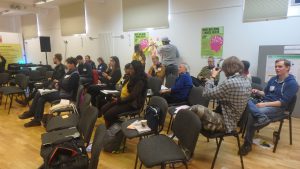
After a tasty and regenerative lunch, Lucinda Heyman (Royal College of Music) kicked off the third session with a paper focusing on the health of popular musicians. She explained, for example, that while younger artists might be more aware of and willing to talk about this topic, younger music students are also increasingly worried that a career in the arts would negatively affect their health. A possible answer to this conundrum might lie in Alfia Nakipbekova (University of Leeds) and Caterina McEvoy (University of Sheffield) presentation. The cellist and composer, respectively, showed the relationships between music performance and martial arts, and how their own practice in both fields interact with each other. The paper was illustrated by a performance of their piece of Flux and Flow. Caterina’s captivating soundscapes accompanied Alfia’s performance on an electric cello; including Qi Gong movements and strings played by a sword!
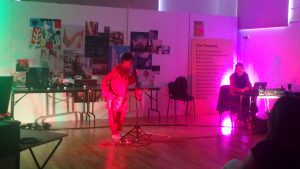
The study day concluded with Claudia Nader’s (University of York) paper on the potential use of the Autonomous Sensory Meridian Response (ASMR) to treat mental health conditions. This is the sensation that we might get when hearing someone whispering or crunching a piece of paper, for example; often described as a ‘tingling’. The presentation included live performances of sounds intended to provoke an ASMR experience in the listeners. The lively discussions that were initiated during the study day were continued during the dinner at an excellent local curry house.
Workshop Day
The Sunday was reserved for practical sessions around some of the topics that had been explored the previous day, with some of the presenters also delivering a workshop. Case in point, Sara Clethero ran a singing session like the ones that she runs for autistic adults. The participation of one of her regular attendees proved insightful as he gave us an ‘inside’ perspective to the sessions. Then, Alfia Nakipbekova – a Tai Chi champion as well as a cellist – delivered an energising Qi Gong session during which she explored movements that are both accessible but useful to musicians and their wellbeing. We made the most of the beautiful weather and the session took place on the lawn of the College’s Edwardian building!
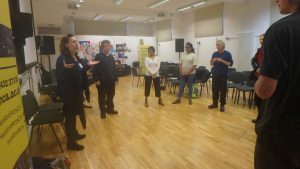
Before lunch, Claudia Nader taught the delegates how to record sounds that might produce an ASMR sensation. Armed with individual headphones, many of the delegates joined in and explored the close micing of everyday sounds; they included keys, zips, paper clips, etc. After an inspiring morning, the delicious lunch gave everyone a chance to continue debating issues around music, wellbeing and mental health.
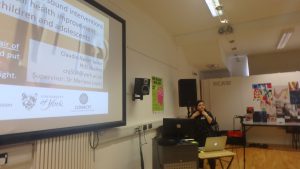
They ‘keynote’ workshop was led by Sarah Brand (Guildhall School of Music and Drama). The experience trombonist and music therapist introduced us to teaching music therapy students how to improvise in a therapeutic setting. The fascinating hands-on session was also a chance for the undergraduate HCA students to improvise and engage with the event. Sarah was able to answer the delegates’ many questions and overall was an excellent workshop leader. Energised by Sarah’s session, the day’s last workshop was introduced by Greg Leutchford from the Hereford-based mental health services provider Oak House, who gave an introduction to music therapy sessions currently running in Hereford. This led to a final discussion during which all delegates were asked to give any feedback or thoughts they wished to. The overwhelming feeling was that the discussions that we had during the weekend need to be continued. We also need to find ways to talk to a wider public who might not be aware of issues around wellbeing and mental health, or what can be done about them.
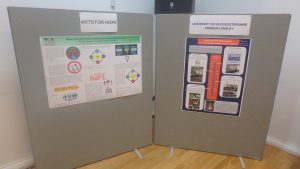
This was another successful edition of Music, Wellbeing and Mental Health and we hope that it will continue to happen. Hereford College of Arts was a very welcoming host institution which set the perfect scene for a weekend of music and discussions.
